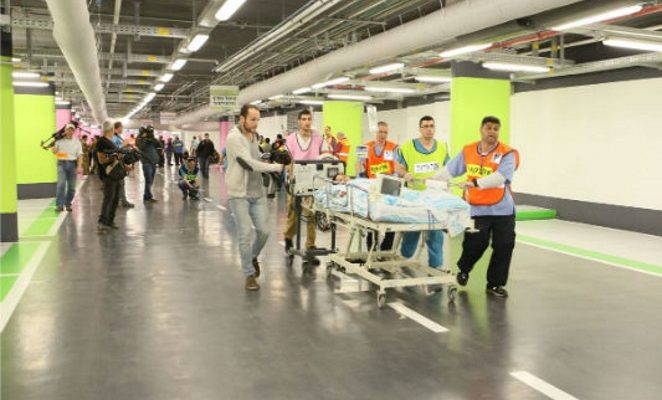Rambam Medical Center’s new emergency underground command center is now operational.
By: World Israel News Staff
In the shadow of increasing tensions on Israel’s northern border, Israel’s largest hospital in the north this week inaugurated a command center for its fortified underground emergency hospital.
Haifa’s Rambam Health Care Campus, situated in proximity to the border with Lebanon, has been operating the Sammy Ofer Fortified Underground Emergency Hospital (FUEH), designed to treat 2,000 patients from throughout the northern region in time of war.
FUEH is the largest of its kind in the world, designed to protect the patients of northern Israel in times of war. The concept behind this integrated parking lot/underground hospital was conceived after the Second Lebanon War, during which the hospital came under direct rocket fire. Lessons learned from that experience led to the design and construction of the underground hospital to assure the safety of Rambam’s patients and personnel.
Another drive to construct such a facility emanates from the understanding that the next war will necessitate provision of medical care under fire.
The new command center assembles critical information from the underground facility in real time, where it is analyzed and displayed on screens for decision-making purpose, with the help of an emergency software system developed at Rambam and adopted by the Ministry of Health.
Until now, the Command Center has operated from an unprotected area on the ground floor of the main hospital. The multi-disciplinary team that operates the hospital during wartime and emergencies will now be situated in the new Command Center, making it the nerve center of the underground hospital.
Of note, the Command Center was planned as part of the construction of the underground hospital, but due to budgetary problems, the work was postponed. Only in 2017, after the donation from the IFCJ a $1 million donation from the International Fellowship of Christians and Jews (IFCJ), did planning and execution commence.
Professor Rafi Beyar, director of Rambam, stated that the hospital has “completed the mission so that we can respond to emergency events in the best possible way for the hundreds of patients expected to reach us from throughout the northern region. We are prepared for any eventuality.”





